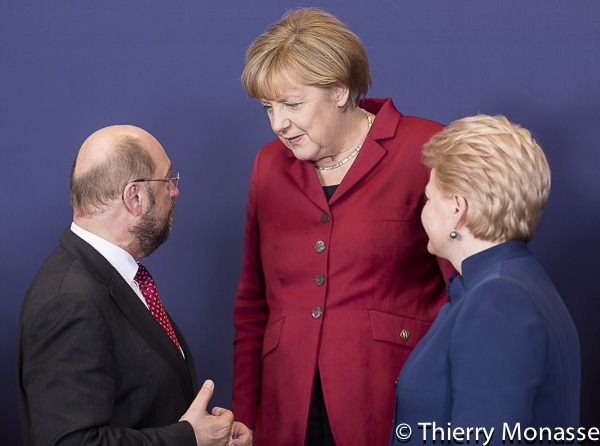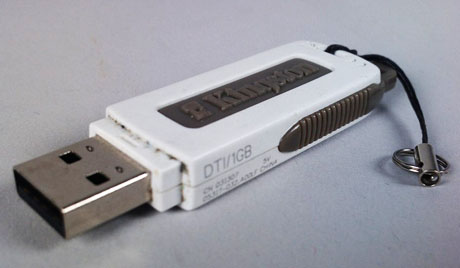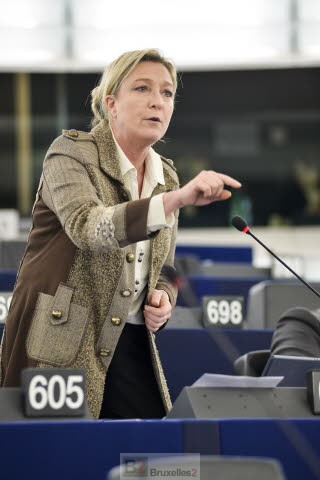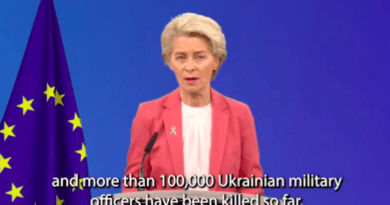Thanks Barrack!
(BRUXELLES2) Le dernier sommet européen aura vu Français et Allemands réunis dans une initiative commune. Configuration assez rare en matière de politique étrangère pour être signalée et commentée. On avait pris l’habitude, ces derniers mois, de voir les points de vue des Allemands et des Français diverger de façon importante, pour ne pas dire être totalement contraires, et les diplomaties nationales s’employer ensuite à raccommoder ces différences.
Que ce soit sur l’intervention en Libye ou les frappes militaires en Syrie, sur l’embargo sur les armes, les points de crispation étaient nombreux. L’espionnage par la NSA du portable de Angela Merkel, astucieusement rendu public aujourd’hui, comme des écoutes passées en France, rapprochent aujourd’hui les deux alliés. Berlin et Paris peuvent donc dire merci à Barack… Le Royaume-Uni se tenant coi, impliqué dans le dispositif d’écoute américain.
Une même longueur d’ondes
Il y a l’approche politique, démontrée par Angela Merkel, qui vise à une explication de texte avec les Américains. « La confiance est ébranlée. (…) Nous sommes des alliés, mais une telle alliance peut être construite que sur la confiance. L’espionnage entre amis n’est pas possible » Même longueur d’ondes chez François Hollande. « We don't spy on each other among allies. In the very name of the relationship between Europeans and Americans or between France and the United States, we must do everything so that trust can be established”.
An economic issue
Mais l’enjeu n’est pas seulement politique. Il est économique et démocratique, comme l’a rappelé François Hollande. « The question is not a problem of political information. Quite frankly, there are enough exchanges between heads of state that there are not many secrets that remain, especially between allies. The challenge is most often economic, because this data has a price. And finally, it is of course about freedoms, even if the goal is counter-terrorism and security. »
Technology is not enough
Paradoxalement, le président Français souligne que l’autonomie technologique n’est pas nécessaire… « To think that it is simply because we ourselves would have control of the product that we could be protected from possible surveillance or interceptions, would be an illusion. This supposes, it is the direction of the approach which we engage, that the services themselves, have rules of conduct. »
Establish a code of conduct
Ce que veulent les deux pays, c’est « define a non-spying agreement between European allies and with the United States. "Ensuring security, carrying out checks is legitimate. We are in a dangerous world, we should not let our guard down. ". Among these rules of conduct, Fr. Hollande traced three: “ La première règle est qu’on ne surveille et on ne contrôle pas les portables des personnes qu’on rencontre dans des sommets internationaux. (Deuxièmement) on s’informe mutuellement. (Troisièmement) on ne stocke pas certaines informations qui peuvent mettre en cause la liberté. »
Council Conclusions
“The Heads of State or Government discussed recent developments concerning possible intelligence issues and the deep concerns that these events have raised among European citizens.
They underlined the close relationship between Europe and the USA and the value of that partnership. They expressed their conviction that the partnership must be based on respect and trust, including as concerns the work and cooperation of secret services.
They stressed that intelligence gathering is a vital element in the fight against terrorism. This applies to relations between European countries as well as to relations with the USA. A lack of trust could prejudice the necessary cooperation in the field of intelligence gathering.
The Heads of State or Government took note of the intention of France and Germany to seek bilateral talks with the USA with the aim of finding before the end of the year an understanding on mutual relations in that field. They noted that other EU countries are welcome to join this initiative.
They also pointed to the existing Working Group between the EU and the USA on the related issue of data protection and called for rapid and constructive progress in that respect. »



